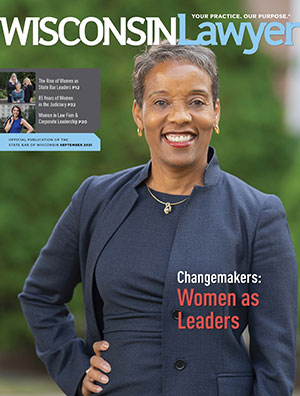
Dec. 15, 2021 – During 2021, Wisconsin’s legal community pressed on through the second year of the COVID-19 pandemic. Lawyers adapted their practices to the pandemic’s ‘new normal’ – virtual appearances and conferences, working from home, and new wrinkles of law and business created by public health measures enacted to combat the virus.
Begun as a necessity in 2020, virtual meetings were recognized as a virtue in 2021, as the savings in both travel costs and time they afforded to lawyers, judges, and clients became apparent. The potential for lawyers in cities to serve clients in far-flung rural areas via Zoom, without having to leave their offices, promised some relief to the shortage of lawyers in northern counties.
High-profile legal issue like redistricting, the legality of vaccine mandates, and the aftermath of last year’s racial justice protests dominated the headlines. And while those issues were important, quieter ‘nuts-and-bolts’ issues commanded most lawyers’ waking attention.
All the while, State Bar of Wisconsin members continued to mark career milestones, bestow and accept awards, and volunteer their time with the State Bar’s 26 sections and 20 committees.
We look back on 2021 by highlighting some of the State Bar’s top articles, in no particular order. The articles appeared in
Wisconsin Lawyer™, WisBar’s
InsideTrack™, as well as State Bar section blogs.
For the first time this year, we’ve included entries from WisLawNOW, the State Bar’s blog portal and aggregator. It’s a way to recognize the increasingly important role played by legal blogs and to spotlight some great writing by our members.
We used online readership metrics and the opinions of State Bar editors to choose the articles and blog entries.
The Top 29 Articles of 2021

1.Battle Maps: A History of Wisconsin Redistricting Law (WL, May)
Decennial dust-ups over drawing the boundaries of Wisconsin’s congressional and legislative districts are as old as the state itself, Joseph Ranney wrote.
“Redistricting disputes began almost immediately after statehood. In 1851, Gov. Nelson Dewey, a Whig, vetoed the Democratic-majority legislature’s apportionment act as too partisan. In 1890, Democrats gained temporary control after decades of Republican dominance and tried to redistrict the state to their advantage.”
Ranney concluded that the state’s divided government made it likely that the 2021 maps would be drawn by a court, as they were after the 1980, 1990 and 2000 census.
“The closest thing to a safe bet for the coming redistricting process is that some or all of these issues will surface and that Wisconsin will change the contours of U.S. redistricting law once again.”
2.18 Legal Super Stars, 18 Reasons to Celebrate (IT, May)
Eighteen members of Wisconsin’s legal community were honored during the State Bar’s Annual Meeting and Conference, held virtually in June for the second year in a row.
“Join the State Bar of Wisconsin in celebrating those who make a difference in the legal profession and in their communities. Recognized by their peers and colleagues, these jurists, lawyers, law students, and legal workers are celebrated for their leadership.”
Awards included Lifetime Jurist, Judge of the Year, the Dunn Award (best
Wisconsin Lawyer article), and pro bono attorneys of the year, among others.

3.Special Focus on Women in the Law (WL, September)
The September 2021 issue of
Wisconsin Lawyer included a number of articles on the rise of women in Wisconsin’s legal profession.
A cover piece, “The Rise of Women as State Bar Leaders,” explores the history of this historical moment: for the first time in the 143-year history of the State Bar, women hold all six officer positions. Women also represent a majority of the Board of Governors.
“This article provides a glimpse of the State Bar’s concerted and deliberate efforts, both past and present, to increase participation of women in bar leadership, with perspectives from many of the women bar leaders who were involved in these efforts,” wrote then legal writer Joe Forward.
In “Glacial Change: Women in Law Firm & Corporate Leadership,” writer Ed Finkel notes that women are still underrepresented in these leadership positions. But he talked to a number of law firm, corporate, and industry leaders who have a pulse on what’s happening in Wisconsin and nationwide.
“I’m very hopeful that we will see substantial improvement over the next five years. But you have to be intentional,” said Michele L. Perreault, managing partner of DeWitt LLP’s Madison office.
Milwaukee County Circuit Court Judge Hannah Dugan explored women on the bench in “Lady Justice: 85 Years of Women in the Wisconsin Judiciary,” and lawyer and historian Joseph Ranney discussed “Five Women Who Shaped Wisconsin Law.”
Former U.W. Law School Dean Margaret Raymond closed out the issue with “Final Thought: Being First Is a Privilege, and it Comes with a Responsibility.”
“Whether by means of providing support, encouragement, empathy, advice, or opportunities, it’s my responsibility to hold the door open for others,” she wrote.
4.Judge Ralph Ramirez: On the Art and Science of Being a Judge (IT, May)
Judge Ralph Ramirez, who in 1999 became the first Latino to be elected circuit court judge in Wisconsin without first being appointed, was selected as 2021’s Judge of the Year. He was profiled by Shannon Green, the State Bar’s communications writer.
His philosophy? “There is both art and science to being a judge. The science is about statutes and the law. The art is calendaring, how you treat people, how you conduct yourself, and how you maintain control in your courtroom – not as an authoritarian, but proper, appropriate, and considerate control,” Judge Ramirez said. “The art of the courtroom is very important.’
In terms of the art of the courtroom, Judge Ramirez’s outlook is simple: it’s all about you, not about him. “When you come to my court, whether you’re a litigant or attorney, and even if it’s the most mundane matter I’ve handled 20 times that day, I am looking at you and I am listening to what you say,” he said. “It is that important.’”

5.New Minor Guardianship Law: Changing Children’s Lives (WL, January)
Beth Lauck and Courtney Roelandts described the changes to guardianship law made by Act 109, which Governor Tony Evers signed into law in February 2020.
“The new law moves private minor guardianships of the person from chapter 54 to Wis. Stat. chapter 48 (hereinafter chapter 48) and creates
Wis. Stat. section 48.9795, ‘Appointment of guardian of the person for a child.’ Private guardianships of the estate for children remain under chapter 54. The new section does not change the standard or process for guardianships under Wis. Stat. sections 48.831 and 48.977 when the child is involved in the formal child welfare system.
“However, as is discussed below, the new law does have implications for children involved in the child welfare or juvenile justice systems with cases pending under Wis. Stat. sections 48.13, 48.133, or 48.14(1) to (10) or (12) or chapter 938.”
6.
COVID-19 Vaccine Policy Considerations for Wisconsin Employers (State Bar Labor & Employment Law Blog, January)
In this blog entry, Janelle Schlosser reviewed the risks that adopting mandatory vaccine policies pose for employers.
“Although employers now have the option to require a mandatory vaccine for their employees, it is necessary for employers to consider all avenues to provide the safest work environment for their employees,” Schlosser wrote. “Making a mandatory vaccination policy for some employers may not be the most effective route to providing that environment.
“There may be more risks with implementing a mandatory policy versus a voluntary policy, so it is important that employers research and identify all their options and the legalities that come with the different choices.”
7.50-Year Members: Classes of 1970-1971 Entered Profession in Turbulent Times (IT, June)
State Bar members who graduated from law school in 1970 and 1971 began their careers amid unrest stoked by anti-war protests, assassinations, and the clamor for a more just society.
One of those members,
Judge Moria Krueger, was frank with legal writer Joe Forward about the gender inequality she and other young women lawyers faced.
“’Being a new lawyer in 1970 was very different for a woman than it was for a man,’ said Krueger, who would go on to become the Dane County Circuit Court’s first woman judge, after winning a controversial election covered by the
New York Times.”
Krueger was one of numerous 50-year members featured throughout 2021, including
Tom Sleik,
Walter Dickey,
Hector de la Mora,
Martin Greenberg,
Rick Phelps, and
Marshall Gratz.

8.
A Primer: Crowdfunding for Legal Fees (WL, March)
Aviva Meridian Kaiser explored the ethical issues raised by lawyers accepting fees via online donations.
“Although crowdfunding has opened up access to capital for entrepreneurs and small-business founders, law has not experienced the same trend,” wrote Kaiser. “One possible explanation is that – unlike entrepreneurs and small-business founders – lawyers are limited by ethical considerations.
“Donation-based crowdfunding may provide financial resources for individuals who might otherwise be unable to afford legal services, but lawyers must proceed cautiously …The ethical considerations vary depending on the lawyer’s level of involvement in the donation-based crowdfunding effort.”
9.
Court Watch: High-Profile U.S. Supreme Court Decisions Expected in June (IT, May)
A survey of pending U.S. Supreme Court decisions discussed cases dealing with the Fourth Amendment, eminent domain law, and free speech.
“The U.S. Supreme Court appears poised to release more than 70 merits opinions by the end of June, up from 53 last term, the fewest number of decisions in more than 100 years,” wrote legal writer Joe Forward.
“The court generally releases decisions in some of its most high-profile cases in June each year. So far this term, the nation’s high court has issued 32 signed merits decisions, with 39 cases still pending after oral arguments.”
10.
Why Your Client’s PODs at Banks May Be Ineffective (State Bar Real Property, Probate, and Trust Law Blog, November)
In this blog post, Jeff Goldman discussed two statehouse bills that, if enacted, would affect clients' payable on death (POD) designations.
“By including language in account agreements, banks have been able to apply funds deposited at their institution – funds that would otherwise be controlled by the account holder’s POD designation – directly to a decedent’s outstanding debt owed to that institution,
without any need to file a claim,” wrote Goldman.
“Now, under new legislation being proposed in the State Assembly and State Senate (AB 596/SB 596), banks would be able to take such funds at the decedent’s death and apply them to the depositor’s debt at their institution
even without contract language with the depositor.”
11.Disinformation and The Justice System (WL, April)
Mark Goldstein described efforts to combat the corrosive effects disinformation campaigns have on our justice system.
“The sharing of false information for nefarious purposes is nothing new,” Goldstein wrote. “What is new is the way in which the internet, and social media in particular, have lowered barriers to entry, allowed for information to spread much more rapidly, and made the challenge of combatting disinformation considerably harder.
“Also, certain technologies have given disinformation campaigns the adaptability of a virus. The Brookings Institution mentions that those seeking to dis-inform have come up with new ways to make fake accounts seem legitimate, including artificial intelligence (AI)-generated profile pictures.”

12.Facebook Ethics: Tennessee Court Rejects Lawyer’s ‘Sarcasm’ Defense (IT, February)
A Facebook exchange between a lawyer and a woman estranged from her ex-boyfriend had significant consequences, after the Tennessee Supreme Court issued an ethics decision.
“Subsequently, the Board of Professional Responsibility (BPR) alleged the attorney violated Rule 8.4 (misconduct) by counseling the woman ‘about how to engage in criminal conduct in a manner that would minimize the likelihood of arrest or conviction.’”
“In disciplinary hearings, the attorney admitted to his Facebook posts. However, he argued that his posts about luring the ex-boyfriend into the woman’s home and then using the ‘castle doctrine’ as a defense was ‘sarcasm’ or ‘dark humor.’”
13.#Free Britney: When Protections Turn Toxic (WL, October)
A hearing on the conservatorship ordered for Britney Spears provided the backdrop for a survey of the issues surrounding guardianships and conservatorships.
“Granting a guardianship when one is not needed can aggravate the very concerns that raised the question of guardianship,” wrote Kelly Mould and Kate Trudell.
“A loss of decision-making power reduces an individual’s opportunity to learn to make choices, refine decision-making, and gain experience in trial and error, good and bad decision-making, and the natural consequences thereof.”
14.OWI Law: New Decision in the Implied Consent, Unconscious Driver Saga (IT, July)
In a recent case that originated in Wisconsin, the U.S. Supreme Court held that exigent circumstances almost always permit a blood draw on an unconscious motorist. But the decision left unanswered whether Wisconsin’s implied consent law justifies a warrantless blood draw on an unconscious motorist.
“In recent years, the Wisconsin Supreme Court justices have been divided on the question of whether the implied consent law is sufficient, alone, to allow warrantless blood draws when drivers are unconscious and incapable of withdrawing consent,” wrote legal writer Joe Forward.
“Recently, in
State v. Prado, 2021 WI 64 (June 18, 2021), a Wisconsin Supreme Court majority ruled that Wisconsin’s implied consent law, as applied to incapacitated drivers, is ‘unconstitutional beyond a reasonable doubt,’ which lays this issue to rest (for now).”

15.Update: Proposed Changes to Family Law in Wisconsin (State Bar Family Law Section Blog, November)
In this blog post, Emily Tercilla reviewed four bills that if enacted would mean big changes for Wisconsin family law practitioners.
“The intention of Senate Bill 603 is to expand a court commissioner’s authority over a final hearing for divorce to a final hearing for legal separation,” Tercilla wrote.
“If the bill becomes law, a court commissioner may preside over a final hearing for legal separation if both parties believe the marital relationship is broken and the parties have resolved all material issues, or if one party has not participated in the legal separation process.”
16.COVID-19 Vaccination: Legal Landscape and Challenges (WL, February)
Precedent from the smallpox epidemic of the early 1900s offered some guidance for health officials seeking to adopt COVID-19 policies, wrote Marguerite Hammes and Grant Killoran.
“Under the 10th Amendment to the U.S. Constitution, the power to address public health emergencies generally is held by the states, not the federal government. More than a century ago, the U.S. Supreme Court decided the seminal case on state power to respond to a public health crisis,
Jacobson v. Commonwealth of Massachusetts.
“In
Jacobson, the Court upheld the constitutionality of a state law authorizing a municipal order requiring all inhabitants to be vaccinated against a communicable disease and specifying a fine for noncompliance.”

17.Human Trafficking in Wisconsin: Lifelines for Survivors (WL, October)
Rachel K. Monaco explored how the pandemic has affected the work that Wisconsin lawyers, advocates, and nonprofits do on behalf of sex trafficking victims.
“Services were fewer and harder to deliver, everywhere,” Monaco wrote. “Basic survival and safety crises were exacerbated for individuals who were already among the most vulnerable and in areas where there were limited services to begin with. Marginalized populations especially faced discrimination and experienced cherry-picking in the distribution of limited resources.”
Look for Monaco’s article on labor trafficking in the January 2022
Wisconsin Lawyer.
18.Trust Account Scams Increasingly Target Wisconsin Law Firms (IT, August)
Christopher Shattuck, practice management advisor for the State Bar’s Practice411™ program, warned members to beware of email scams aimed at their trust accounts.
“If you receive a suspicious email from a prospective business client and their email address is hosted through a free email service, like Gmail, Yahoo, or Microsoft, instead of a .com business email address, inform the prospective client that you will be contacting them directly through the phone number listed on their official website,” Shattuck wrote.
“Calling the business directly will typically reveal whether the alleged company representative works at the company or whether others have called about the alleged representation.”

19.Tipping Off with Bucks Lawyer Mike Sneathern (WL, June)
In the month when the Milwaukee Bucks won their first championship in 50 years, legal writer Joe Forward profiled Mike Sneathern, the team’s chief legal officer.
Sneathern learned about the sports-law program at Marquette University Law School but had never visited Wisconsin. He took a leap of faith, thinking he would return to California after finishing at Marquette. But in his second year, he landed an internship with the Bucks.
“I quickly realized how fortunate I was to have this position, and decided to stay,” Sneathern said. “‘My responsibilities include management of the day-to-day legal affairs of the Bucks and all of our affiliate entities. Every single day is different.”
20.
The Scourge of Boilerplate Objections (State Bar Litigation Blog, April)
Ralph Tease and David S. Blinka wrote about the pernicious rise of boilerplate objections to written requests for discovery. Such objections have no basis in the rules of civil procedure, they wrote, and are frowned upon by judges.
“Boilerplate objections are routinely denounced by federal courts,” they wrote. “Failing to specifically inform the requesting party of the basis for an objection creates uncertainty, because the requesting party cannot determine whether a discovery response is complete or whether discoverable information is being withheld unjustifiably.
“Further, boilerplate objections lack sufficient information to allow courts to properly evaluate the merits of the objection being asserted, and as a result, cause delay, expense, and congestion in the administration of civil cases.”
 Jeff M. Brown is a legal writer for the State Bar of Wisconsin, Madison. He can be reached by email or by phone at (608) 250-6126.
Jeff M. Brown is a legal writer for the State Bar of Wisconsin, Madison. He can be reached by email or by phone at (608) 250-6126.
21.
American Dream Turned Nightmare: Liability for Undisclosed Defects in Real Estate Sales (WL, June)
Kevin Trost examined how the hot housing market impels sellers and buyers to overlook legal safeguards in the home buying process, often to their detriment.
“One effect of the current market is that in order to present a more attractive offer to sellers, more buyers forego due diligence and waive the home-inspection contingency,” Trost wrote. “Months or years down the road, these homeowners may regret their haste after a significant undisclosed defect with the home appears. The homeowners may discover a leaky roof, a termite infestation, an unstable foundation, or any number of possible problems.”
22.
Ripe for Abuse: How Joint Accounts Thwart Estate Plans (WL, May)
Joint accounts make it easy to pay bills or move assets upon a person’s death without having to go through probate. But they can also upend a decedent’s estate plan, wrote Peter Walsh and Aaron Foley.
“Estate planning clients often express surprise when they learn that another holder can use all funds in the joint account without explanation and that the funds pass to the surviving holder upon the client’s death regardless of the provisions of the client’s will. This raises the issue of how many people go to their graves without knowing that the contents of a joint account will pass to the other holders instead of as provided by their will.
“Once informed of these presumptions, many clients indicate that they trust the adult child (or other holder) to share the balance with the child’s siblings (or other intended recipients). This trust too often proves to be misplaced.”

23.
Tip of the Iceberg: Opiod Litigation and Wisconsin’s Latest $573 Million Settlement (IT, February)
Legal writer Joe Forward examined the implications of a $573 million multi-state settlement with McKinsey & Company. The lawsuit was spurred on by the national opioid epidemic, which over 20 years has killed almost 500,000 people.
“Wisconsin will receive $10.3 million in the multistate agreement to abate problems cause by opioids. ‘As this case shows, getting accountability can mean additional resources to help communities mitigate the epidemic,’ said [Wisconsin Attorney General Josh] Kaul in the announcement. ‘It can also deter the kind of misconduct that could lead to future epidemics.’
“The opioid crisis is decades in the making, and now opioid manufacturers, distributors, pharmacies, prescribers, and consulting firms are facing the litigation music.”
24.
Ballot for the Ballot Box (WL, April)
In the month when Wisconsin voters chose a new superintendent of public instruction, Leslie Anne Freehill surveyed the spate of legal challenges filed in the wake of state and local elections in 2020. The challenges presage a rise in public interest in election law, as well as a legislative response, Freehill wrote.
“First, the ins and outs of state election statutes will no longer be an esoteric area of interest for municipal clerks and their staffs and niche attorneys. Public interest in enforcing or modifying those laws continues to grow. This is especially true if voter preference for absentee early voting continues after the pandemic. In April and November 2020, for the first time on record, the majority of total ballots cast in Wisconsin were absentee ballots.”
25.
New Emeritus Rules Reflect Our Changing Profession (State Bar Senior Lawyer Division’s Blog of Experience, October)
In this blog post, Michael May reviewed new rules for emeritus status for Wisconsin lawyers.
“One major change in the rules is that the use of the term ‘Emeritus’ is for lawyers over age 70 who have retired from the practice of law in Wisconsin other than pro bono service, as provided in SCR 10.03(3)(am),” wrote May. “Those who choose the title ‘Emeritus’ are inactive members of the State Bar.”
“This change brings the use of the term ‘Emeritus’ back to its more accepted meaning: a person who has retired and has both earned and chosen to use the term as an honorific title after ending their active professional career.
“The rules also effectively changed what was considered Emeritus status to 75 years of age, rather than the former rule of 70 years. Lawyers 75 years of age or older who are still practicing will be called “Senior Active” attorneys (with legacy status granted for lawyers who gained Emeritus status under the old rules – before July 1, 2021).

26.
A Litigation’s Reprise: Strategies for Requesting Attorney Fees (WL, January)
Oftentimes, a summary judgment ruling or jury award isn’t the end of the fight, wrote Christa Wittenberg and Dean Laing – it’s but a prelude to a tussle over attorney fees. In this article, Wittenberg and Laing discussed crafting and deploying winning arguments.
“Strategically, an important consideration faced by a party seeking to file a fee petition relates to timing. In many cases, it will make sense to strike while the iron is hot, and parties seeking to file fee petitions may choose to do so promptly, sometimes long before applicable deadlines may require.”
27.
The Future of Zoom Hearings: Petition Addresses Videoconferencing in Court (IT, March)
The Wisconsin Supreme Court’s consideration of a petition to clarify the use of videoconferencing for court proceedings garnered broad – but not unanimous – support, wrote legal writer Joe Forward.
“Numerous circuit court judges and members of law enforcement have voiced support for the petition. But criminal defense lawyers are concerned that allowing video conferencing in certain situations could infringe on the rights of criminal defendants, including the Sixth Amendment right to confront the witnesses against them.
“State Public Defender Kelli Thompson, in correspondence submitted to the court ahead of an April 7 hearing, argued that that ‘any expansion on the use of videoconferencing technology in critical proceedings must be accompanied with a provision allowing the defendant the unqualified right to demand that the proceeding be held in person.’”
28.
Reflections: On Being a New Lawyer – What I Learned in Year One (WL, March)
During her first year of practice, Paulina Fernandez learned to embrace mistakes and to commiserate with other new lawyers.
“Sharing experiences with new attorneys creates a bond,” Fernandez wrote. “We all experience anxiety, fear, and pressure in the first year, and talking about it helps.
“My new friend made me feel like I was not alone, and throughout my first year, we kept in touch by texting each other every couple of weeks. We asked each other, ‘How are you doing?’ but it meant, ‘How are you surviving this first year?’ These small conversation check-ins reminded me that I was not alone in this experience.”
29.
On Shared Placement: ‘Regular’ and ‘Meaningful’ May Not Mean Equal Time (State Bar Family Law Section Blog, February)
Wisconsin law contains no presumption in favor of nor right to equal custody, wrote Commissioner Mark Fremgen. Instead, child custody decisions are made on a case-by-case basis.
“It comes as a surprise to the litigants that there is no right to equal periods of placement. In fact, the law specifically suggests otherwise.
“However, the statute does direct courts to order ‘regular’ and ‘meaningful’ periods of placement with each parent that considers the requisite facts, the geographic distances, the unique needs of the children, and the circumstances of each home.
“What this looks like is different in each individual case, because by its very nature, a placement schedule with one family is likely to be different from a placement schedule with another family.”
Best of WisLawNOW 2021

In 2020, the State Bar of Wisconsin launched a new online community exclusive for Wisconsin legal bloggers. Called
WisLawNOW, this community brings together blog content written by State Bar of Wisconsin members under a single website.
More than 40 Wisconsin legal blogs have joined WisLawNOW to expand their reach, showcase expertise, and contribute to this digital collection of legal information. Here are the top 10 most-read articles that were posted in 2021.
CDC Eviction Moratorium Extended Until July 31 (Joe Andreoni, KEW Tips)
Court of Appeals Takes Hard Line on Appeals from Municipal Court Decisions (State Public Defender, On Point)
Cops May Extend Traffic Stops to Ask Drivers About their Medications (State Public Defender, On Point)
Proposed Gift and Estate Tax Changes Mean Some May Need to Act Now (Mark Bradley, Ruder Ware News & Insights)
Plan Ahead to Make Summer Memories at the Family Cabin Last Forever (Shanna Yonke, Ruder Ware News & Insights)
What Employers Should Know About Religious Exemptions to the COVID19 Vaccine (Barbara Zabawa, Center for Health & Wellness Law Blog)
Wisconsin Enacts COVID-19 Civil Liability Shield (Matthew DeLange & Brittany Lopez Naleid, Reinhart Boerner Van Deuren S.C. Alerts and Updates)
U.S. Department of Justice Gives Go-Ahead to Mandatory COVID-19 Vaccines in the Workplace (Natalie D. Fluker & John Rubin, von Briesen & Roper S.C. News)
Crowdfund the Kraken! Crowdfunding Legal Fees (Stacie Rosenzweig, Ethicking Blog)
Court of Appeals Holds that Prejudgment Interest Can Be Triggered without a Demand (Jeffrey Mandell & Bruce Huibregtse, Stafford Rosenbaum Law Blog)
